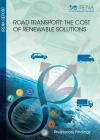

Road Transport: The Cost of Renewable Solutions
Newsletter
Advanced biofuels, electric vehicles and biomethane for transport could be competitive against fossil-fuel transport options by 2020 in an increasing number of market segments, as long as support policies are enhanced and expanded. IRENA’s costing study, Road Transport: The Cost of Renewable Solutions, finds an increasingly positive outlook for the use of renewable energy in road transport by 2020 and beyond.
The use of renewables in the transport sector remains low, accounting for only 2.5% of energy consumption for all types of transport, and 3.3% for road transport, in 2010. Advanced biofuels – less dependent than conventional biofuels on volatile food-related feedstock prices – are just starting to be produced at commercial scale. The signs are encouraging, yet continued research, development and deployment, funded by both public and private sources, remains essential to find the least-cost technology pathways.
Meanwhile, mass production has started for both plug-in hybrid and pure electric vehicles. While costs are falling, infrastructure investments are needed for recharging stations. Similarly, widespread biomethane adoption requires refuelling stations. While the current environment for renewables in transport is challenging, IRENA’s analysis presents the latest cost data and shows an increasingly positive outlook, while confirming the need for enhanced support at this critical stage.




